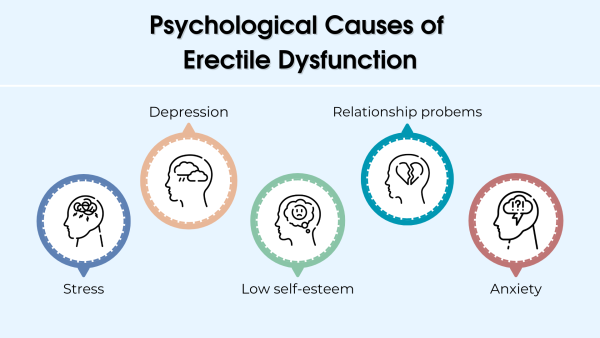Getting Real About Erectile Dysfunction
Erectile dysfunction (ED) is a topic many avoid discussing, yet it significantly affects both partners in a relationship. When you struggle to achieve or maintain an erection, it’s tempting to offer excuses – stress, fatigue or simply not feeling well. However, honesty is crucial. If left unaddressed, ED can become a persistent issue, impacting not just sexual health but also self-esteem and your relationship. Acknowledging the issue is the first step toward finding a solution.
The Emotional Toll of ED
The consequences of ED extend far beyond physical challenges. Your partner may wrongly assume that the inability to perform is their fault. Perhaps they feel unattractive, worry about doing something wrong in bed or even think that you are interested in someone else. This miscommunication can create deeper emotional rifts than the physical issue itself. When one partner feels insecure, it can lead to anxiety and resentment, further complicating the relationship. Therefore, it is essential to confront the reality of your condition together, fostering an environment of support and understanding.
Relationship Dynamics
Sometimes, the underlying cause of ED may relate to the relationship itself. The old saying, “Familiarity breeds contempt,” rings true in many long-term partnerships. Over time the excitement and novelty that once fueled your intimacy can fade away. This lack of novelty can dull attraction and leads to diminished desire and performance issues.
It’s a harsh truth, but acknowledging this can be vital for both partners. By addressing these feelings honestly, you can work together to reignite the spark that initially brought you together. Ignoring the issue will just increase the emotional distance.
The Mind-Body Connection
Your mindset plays a crucial role in sexual performance. When you’re experiencing chronic stress or anxiety, it can significantly affect your ability to perform. Psychological factors can create a cycle of frustration: the more anxious you feel about your performance, the harder it becomes to perform. When your mind isn’t engaged or relaxed, your body often follows suit, leading to a disconnect.
This can be particularly disheartening, as relying on muscle memory may only provide temporary relief. To regain engagement, new stimuli or experiences are essential – whether that means exploring different types of intimacy or simply re-approaching your partner with curiosity and affection.
Discussing the Issue
Open and constructive communication is key when facing ED. Rather than simply stating that you no longer feel attracted, approach the conversation with a plan. Explain your feelings sensitively, assuring your partner that your ED is not a reflection of their worth or attractiveness. Discuss potential solutions together, such as exploring new experiences in the bedroom or seeking medical help. Framing the conversation around a shared goal can help reduce anxiety for both partners. For example, suggest setting aside time to explore intimacy in a relaxed setting without the pressure of performance.
Consider discussing options like sex toys or medications. Many treatments are available, ranging from natural remedies to prescription medications like PDE5 inhibitors. These can effectively improve blood flow and enhance erectile function. Consult your doctor for guidance tailored to your situation. For a deeper understanding of your options, read our article, “Which Drug is Best for Erectile Dysfunction? A Comprehensive Guide.”
Having this conversation with your partner shows your commitment to overcoming the issue together. It’s important to approach potential solutions as a team, which not only addresses the physical aspect of ED but also reinforces emotional connection and support.
Coping Strategies and Prevention
Communication is vital in coping with ED. Make it a habit to check in with each other about feelings, concerns and experiences related to your intimacy. Creating a safe space for these discussions fosters an environment of support. Additionally, consider seeking therapy, either individually or as a couple, to work through any underlying issues that may be contributing to your ED.
Maintaining a healthy lifestyle can also prevent ED – regular exercise, a balanced diet rich in fruits and vegetables, and effective stress management techniques can all play significant roles in improving sexual health.
For practical tips on lifestyle changes that can help with ED, consider reading our blog post on this topic. Making adjustments in your daily routine can have a profound impact on your sexual health, and we provide actionable advice to get you started.
Facing erectile dysfunction can be daunting, but it’s essential to acknowledge and address the issue. By fostering open communication with your partner and seeking professional help, you can navigate this challenge together. Remember, you are not alone, and with honesty and effort, you can reclaim intimacy in your relationship. Take the first step today – open the dialogue, seek help, and embark on the journey toward a more satisfying sex life.








